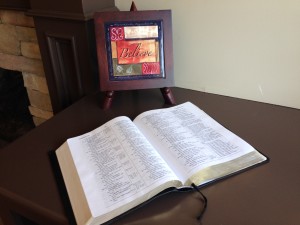Do you think the average Christian can answer a few basic questions about the Bible? Let’s see how you do (don’t cheat, but the answers are at the bottom of this post):
True or false ( You need to know the correct answer if your response is “false”)
- King Saul also went by the name Paul the Apostle.
- Joshua was the son of Nun.
- The authors of James and Jude were half brothers of Jesus.
- Mary, the mother of Jesus, rode a donkey to Bethlehem before giving birth.
- There were three kings that brought gifts to the Baby Jesus.
- Moses lived before Abraham; Abraham lived before Noah; and Noah lived before Methuselah.
- Mary the Mother of Jesus had a cousin named Elizabeth.
- The books of the New Testament were written over a span of time covering the first, second and third centuries and contain secondary source information.
- We know the authors of all the books of the New Testament except one.
- Each book of the Bible is individually written with no connection to the other books.
Short Answer
- Can you name the first five books of the Old Testament and their author(s)?
- What are the divisions of the Old Testament books?
- What is the last book in the Old Testament and the last book in the New Testament?
- Can you name the first five books of the New Testament and their author(s)?
- Who did the Sermon on the Mount?
*Now you can check your answers at the bottom of the post. How did you do?
Watch this short video called “Bible Verse Trivia” to see how others do in their Biblical literacy:
Why is it important for Christians to know such minor details about the Bible?
As long as we have faith we should be fine right, or is just having faith enough when challenges and difficulties come into our lives? Might it be better for us to have faith based on trust in the knowledge we gain from knowing the Bible, and that what it says is based on truth grounded in solid evidence?
When someone attacks Christianity, or make false assumptions about the Bible, Christians should be able to make corrections, but we often don’t or can’t. Why is that? Christians used to be known as people of the Book and they carried it, they read it, they memorized it and they talked about it to everyone because it was the decision maker in their lives.
Is there an epidemic of Biblical Illiteracy?
Most research on the topic of Biblical literacy in America today indicates that it is at an all time low. Kenneth Berding, Professor of New Testament studies at Biola University, says that he has seen a decline in new college freshmen every year for the last 15 years concerning their Biblical knowledge, and these are assumedly Christian kids.
Berding describes the problem as a famine. He believes that one thing contributing to the decline in Biblical literacy is the way Americans view the Bible. Most just don’t see it as significant to their lives and they don’t see it as authoritative.
Of Americans polled nationwide beliefs about the Bible seem to be as follows:
| Barna Research Group Poll Questions | Age Responses |
| 1. Sacredness of the Bible: % of people who believe that the Bible is a holy book. | 45+ = 90%
26–44 = 81% 18–25 = 67% |
| 2. Biblical accuracy: % of people who believe that the Bible is accurate on all accounts. | 65+ = 58%
45-63 = 46% 26-44 = 39% 18-25 = 35% |
| 3. Universalism of the Bible: % of people who believe that the Bible teaches the same spiritual truths as other “so-called” holy books.
|
65+ = 33%
26-63 = 40% 18-25 = 56% |
| 4. Bible appetite: % of people who say they have the desire to gain Bible knowledge. | 65+ = 9%
45-63 = 12% 18-44 = 19% |
Another poll, reported by MSN news, showed that the new third largest category of religious identity worldwide (after Christians 31.5% and Muslims 23.2%) is the unaffiliated group at 16.3% taking over Hinduism at 15%. The unaffiliated group represents all those who profess no religion from atheists and agnostics to people with spiritual beliefs with no link to any established faith. This, I believe this is the group that should be of most concern.
Watch this one minute clip with a few more statistics on Biblical Literacy:
If you want more on statistics from groups that check the religious pulse of our nation, and the world, go to the following websites:
The Barna Group – An evangelical Christian polling firm widely considered to be a leading research organization focused on the intersection of faith and culture.
The Pew Research Center – A nonpartisan fact tank that informs the public about the issues, attitudes and trends shaping America and the world.
What are the implications of a Biblical famine?
I’ve heard it said, “We are what we eat.” If this pertains to food for keeping our physical bodies in shape, what kind of shape are our spiritual bodies in? What are we filling ourselves with if it is not the Word of God and the things of God? What is taking the place of Bible reading, study and prayer?
Nutritionists often advise us to keep a diary of the things we eat so that we can look back and see what might be affecting our weight or the way we feel. What if we kept a diary on our spiritual life? If we look at a week of activities we could identify the time we spend with God and His Word versus the time we spend on other things. Do the things we feed on during the week (spiritually) shape who and what we are?
In John 6:35 Jesus says, “I am the bread of life.” He says this just after the miracle of feeding 5000 people with only a few loaves and fishes. This miracle points to the need we have to not only feed our physical bodies but our spiritual ones as well. When Jesus himself was hungry after fasting 40 days in the wilderness He replied to Satan’s temptation not with a conversation but with Scripture: Man shall not live on bread alone but on every word that proceeds out of the mouth of God. Matthew 4:4
What can we do to become better students of the Word?
“Stop entertaining and start training” says Dr. Norman L. Geisler, Christian Apologist, Theologian, Philosopher and Author of more than 90 books.
How?
Develop A Biblical Christian Worldview:
- Investigate, study and learn God’s Word, the Bible by joining a solid Biblical based Church, class or small group (Deuteronomy 6:4-7; Matthew 22:37; Luke 11:28; Acts 17:11-12; 2 Timothy 3:16-17; James 1:22; 1 Peter 1:20-21; 2 Peter 1:16-18; 20-21)
- Make a decision to follow Christ—confess your sins; be His disciple and learn how to walk in His footsteps (John 3:16; Romans 3:23, 8:1-2, 12:2; 1 John 5:11-13)
- Pray—ask the Holy Spirit to show you God’s truth in Scripture and to lead you in your journey (Luke 11:13; John 14:15-16, 26; John 16:13; Acts 2:38; 1 John 5:6)
- Teach it to others—follow Jesus’ command in the Great Commission and practice apologetics (Matthew 28:19-20; Mark 16:15; Luke 24:47; Acts 1:8; 2 Corinthians 5:20; 1 Peter 3:15)
Join us next week as we will look at the importance of practicing Christian Apologetics as it relates to the reliability, historicity and inspiration of the Bible.
(Answers to quiz)
True or false
- False: King Saul is an Old Testament figure and lived about 1000 years before the Apostle Paul.
- True: Joshua was the leader of the Israelites after Moses and lead them into the Promised Land.
- True: They were the sons of Mary and Joseph.
- False: The Bible does not say. She may have rode a donkey since it was a mode of transportation at the time, but the Bible does not specifically tell us.
- False: The Bible does not say there were three and it does not say that they were Kings but Magi. The Bible does tell us that there were three gifts.
- False: It is the exact opposite: Methuselah, Noah, Abraham, then Moses (they are hundreds of years apart although Methuselah and Noah would have been alive at the same time prior to the flood)
- True: Elizabeth was also the mother of John the Baptist.
- False: They were all written in the first century and are considered primary sources and eyewitness accounts.
- True: Hebrews (although many believe that Paul wrote this book along with most of the other Epistles)
- False: The entire Bible, every book, connects and contains one main thread and storyline that all point to the person and work of Jesus. Even though there are 66 books with 40 authors from various walks of life, written over a period of 1500 years from various places and situations, it contains a seamless story of redemption and salvation.
Short Answers:
- Genesis-Exodus-Leviticus-Numbers-Deuteronomy. Author: Moses
- 1) Books of Moses (Torah); 2) Books of the History of Israel; 3) Books of Wisdom; 4) Books of the Prophets
- Malachi and Revelation
- Matthew-Mark-Luke-John-Acts. Authors: Matthew-Mark/Peter-Luke-John-Luke
- Jesus
You will not find this material in the public school curriculum even though it is based on solid evidence and grounded in research. It is ironic that following the evidence to where it leads stops at the door of our public schools as they will not let a “Divine footprint” in!
Join us this year as we examine evidence for Christianity and learn how to become a thoughtful defender and ambassador of your faith.
Click into the resource page of this website to view many of the top Christian thinkers and apologists along with some of their work; connecting to these types of resources is essential in your Christian growth.
Please let me know what you think: Give feedback, ask questions or send concerns in the comment section of the blog.
Teri Dugan



Sorry, comments are closed for this post.